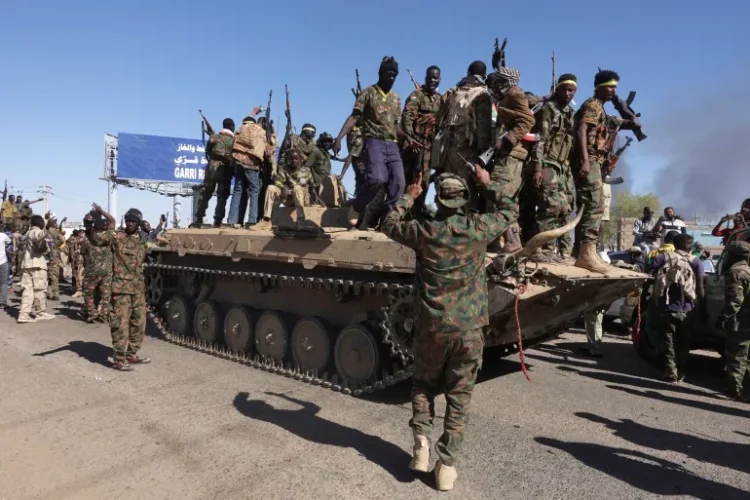As the ongoing conflict in Sudan continues to wreak havoc on the lives of its citizens, the United Arab Emirates (UAE) has taken a firm stand by calling for a humanitarian pause in the fighting, particularly during the holy month of Ramadan. This appeal is an urgent call to all parties involved in the conflict to set aside hostilities for a period of peace, allowing for the safe delivery of humanitarian aid to those in desperate need.
The Conflict in Sudan: A Brief Overview
The situation in Sudan has deteriorated rapidly in recent months, with intense fighting between the Sudanese Armed Forces (SAF) and the Rapid Support Forces (RSF) causing widespread destruction and displacement. The conflict, which erupted in April 2023, has led to significant loss of life, with civilians bearing the brunt of the violence.
Hospitals, schools, and vital infrastructure have been destroyed, and millions have been displaced from their homes. The humanitarian crisis in Sudan has reached alarming proportions, with essential goods, food, and medical supplies in critical shortage. The international community has called for an end to the violence, but despite numerous attempts at mediation, the fighting continues, plunging Sudan further into chaos.

The UAE’s Humanitarian Appeal
Recognizing the profound impact the war is having on the people of Sudan, the UAE has taken a proactive role in addressing the situation. In a statement issued recently, the UAE government called for a humanitarian pause in the fighting during Ramadan, a time when Muslims around the world focus on reflection, compassion, and charity. The UAE’s appeal is driven by the urgent need for humanitarian assistance, which is increasingly difficult to deliver amid ongoing hostilities.
The UAE’s call for a ceasefire is not just a political statement, but an expression of solidarity with the Sudanese people, particularly those suffering the most from the conflict. The country, which has long been at the forefront of humanitarian efforts in the Middle East and Africa, has a vested interest in ensuring peace and stability in Sudan, a country with deep historical ties to the UAE.

The Significance of Ramadan in the Context of Conflict
Ramadan is a sacred month for Muslims around the world, characterized by fasting, prayer, and spiritual reflection. It is a time when Muslims are encouraged to engage in acts of charity, compassion, and solidarity with those in need. In the context of the ongoing war in Sudan, the UAE’s call for a humanitarian pause is particularly poignant, as it aligns with the values of mercy and peace that define the holy month.
The UAE’s request for a pause during Ramadan highlights the global humanitarian spirit that often emerges during this period. It is a reminder that even amidst conflict and turmoil, there is always the opportunity for compassion and kindness. The humanitarian pause would allow aid agencies to deliver critical supplies such as food, water, medicine, and shelter to those most affected by the conflict.
Additionally, Ramadan is a time when many Muslims engage in charitable giving, and the UAE’s initiative could inspire both governments and individuals to contribute to relief efforts in Sudan. The UAE’s commitment to humanitarian support extends beyond words, as the country has already provided substantial aid to Sudan, including medical supplies, food shipments, and financial assistance to support refugees and displaced individuals.

International Support for the UAE’s Call
The UAE’s call for a humanitarian pause has resonated beyond its borders, garnering support from various international bodies, humanitarian organizations, and governments. The United Nations (UN) has also echoed the UAE’s request, urging all parties in Sudan to respect a temporary ceasefire during Ramadan to allow for the safe passage of humanitarian aid.
The Arab League, along with other regional players, has emphasized the importance of humanitarian access in conflict zones and called for an immediate cessation of hostilities in Sudan. These diplomatic efforts are critical in bringing attention to the dire situation in Sudan and encouraging both parties to consider the broader humanitarian impact of their actions.
In addition to diplomatic efforts, several non-governmental organizations (NGOs) and humanitarian groups have expressed their support for the UAE’s call. Organizations such as The Red Cross, Doctors Without Borders, and Save the Children have highlighted the challenges of delivering aid amid active conflict and have urged all sides to allow for a humanitarian truce during Ramadan.
Challenges in Securing a Humanitarian Pause
While the UAE’s call for a humanitarian pause is well-intentioned, the path to achieving such a ceasefire is fraught with challenges. The conflict between the SAF and RSF has proven to be deeply entrenched, with both sides entrenched in their positions and unwilling to concede ground. Past attempts at ceasefires and negotiations have been marred by violations and a lack of trust between the warring factions.
Moreover, the complexity of the conflict means that even if a humanitarian pause were to be agreed upon, the logistics of delivering aid to those in need would remain a significant challenge. Many areas of Sudan remain inaccessible due to ongoing fighting, and the infrastructure needed to deliver aid—such as roads, bridges, and communication networks—has been severely damaged.
The humanitarian community also faces the challenge of ensuring that aid reaches the people who need it most, rather than being diverted or seized by warring factions. These obstacles make the task of securing a meaningful and lasting humanitarian pause in Sudan an uphill battle.
The UAE’s Role in the Broader Middle Eastern Peace Efforts
The UAE has long been a key player in Middle Eastern diplomacy and has worked to facilitate peace and stability in various conflict zones, including Yemen, Syria, and Libya. The UAE’s call for a humanitarian pause in Sudan during Ramadan is part of its broader strategy to position itself as a mediator and peacebroker in regional conflicts.
Through initiatives such as the Abu Dhabi Peace Forum, the UAE has demonstrated its commitment to fostering dialogue and peace in the region. The country has also provided significant financial and logistical support to countries in need, including Sudan, where it has been involved in providing humanitarian assistance and supporting peace-building efforts.
In calling for a humanitarian pause during Ramadan, the UAE is reinforcing its role as a responsible regional power that values human rights and peace. The UAE’s diplomatic efforts have often emphasized the importance of interfaith dialogue, cooperation, and mutual respect, values that are particularly relevant in the context of Ramadan.
Looking Ahead: The Path to Peace in Sudan
As Ramadan approaches, the UAE’s call for a humanitarian pause offers a glimmer of hope for the people of Sudan. The coming weeks will likely be pivotal in determining whether the fighting will subside long enough to allow for meaningful aid deliveries. The UAE’s leadership in advocating for peace during such a sacred time underscores the global call for an end to suffering and the restoration of peace.
The broader international community must continue to exert pressure on all parties involved to prioritize humanitarian needs and consider the long-term consequences of their actions. The UAE’s role in this effort is vital, and its call for peace during Ramadan serves as a reminder that even amidst conflict, compassion and humanity can prevail.
As Ramadan unfolds, the hope remains that a temporary ceasefire will be achieved, giving the people of Sudan the chance to heal, rebuild, and experience the blessings of peace.
Do follow Uae stories for more Updates












